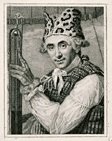Dr. Jeffries and Dr. Warren
When I started looking at Dr. John Jeffries’s records of caring for young smallpox inoculatees in June 1775, I hoped to find clues to his whereabouts during that month.
For almost two hundred years at least, a story has circulated about Jeffries and Dr. Joseph Warren meeting that June, and it’s always struck me as dubious.
To review, Dr. Jeffries (1745-1819) was son of Boston’s treasurer, David Jeffries, and protégé of Dr. James Lloyd. He thus had strong links to both the town’s Whig establishment and to friends of the royal government. Dr. Jeffries dined with the Sons of Liberty in August 1769, but in November 1770 Lloyd and Jeffries testified for the defense in the Boston Massacre trial. The two doctors described the victim Patrick Carr’s dying words, which helped to absolve the soldiers.
That testimony appears to have put Jeffries in the Loyalist camp. The next year, he accepted a sinecure appointment as a Royal Navy surgeon. He evacuated Boston with the British military in 1776, became a military surgeon, and spent the war either with the Crown forces or in London seeking higher positions.
In peacetime, Dr. Jeffries used his money to become a pioneering balloonist, or at least balloon passenger. But eventually the cost of living in the imperial capital and the lure of an inheritance in Massachusetts sent him back home. He reestablished his family and elite practice in Boston.
In 1825, six years after Dr. Jeffries died, Samuel Swett published his pioneering study of the Battle of Bunker Hill. He wrote this about the identification of Dr. Warren’s body on the morning after the battle, 18 June 1775:
TOMORROW: A longer version of the story.
For almost two hundred years at least, a story has circulated about Jeffries and Dr. Joseph Warren meeting that June, and it’s always struck me as dubious.
To review, Dr. Jeffries (1745-1819) was son of Boston’s treasurer, David Jeffries, and protégé of Dr. James Lloyd. He thus had strong links to both the town’s Whig establishment and to friends of the royal government. Dr. Jeffries dined with the Sons of Liberty in August 1769, but in November 1770 Lloyd and Jeffries testified for the defense in the Boston Massacre trial. The two doctors described the victim Patrick Carr’s dying words, which helped to absolve the soldiers.
That testimony appears to have put Jeffries in the Loyalist camp. The next year, he accepted a sinecure appointment as a Royal Navy surgeon. He evacuated Boston with the British military in 1776, became a military surgeon, and spent the war either with the Crown forces or in London seeking higher positions.
In peacetime, Dr. Jeffries used his money to become a pioneering balloonist, or at least balloon passenger. But eventually the cost of living in the imperial capital and the lure of an inheritance in Massachusetts sent him back home. He reestablished his family and elite practice in Boston.
In 1825, six years after Dr. Jeffries died, Samuel Swett published his pioneering study of the Battle of Bunker Hill. He wrote this about the identification of Dr. Warren’s body on the morning after the battle, 18 June 1775:
Dr. Jeffries was on the field dressing the British wounded, and the wounded American prisoners, with his usual humanity and skill. [Gen. William] Howe inquired of him if he could identify Warren; he recollected that he had lost a finger nail and wore a false tooth, and informed the general that Warren had five days before ventured over to Boston in a canoe to get information, invited Jeffries to join the Americans as surgeon, and informed him that he was himself to receive a commission in the army.Swett probably heard that story from Jeffries’s family. It’s certainly complimentary to the late physician, with its superfluous mention of “his usual humanity and skill.” And of course the idea that the heroic Warren had thought enough of Jeffries’s skills to try to recruit him was a ringing endorsement.
TOMORROW: A longer version of the story.


No comments:
Post a Comment